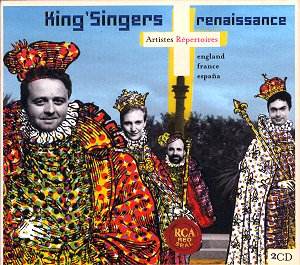




Disc 1:
William BYRD (1543? - 1623): Motet: Haec dies (6vv) [2’04]; Communion Anthem: Beati viscera mariae virginis (5vv) [1’53]; Chant: Ave verum corpus (3vv) (pub.1605) [4’28]; Motet: Vigilate (5vv) (pub.1589) [4’24]; Introit: Viri galilei (5vv) (pub.1607) [2’36]; Anthem: O Lord, make thy servant Elizabeth, our queen (6vv) [3’41]; Anthem: Sing joyfully unto God our strength (6vv) [2’14]; Motet: Laudibus in sanctis (5vv) (pub.1591) [4’39]
Thomas TALLIS (c.1505 - 1585): Hymn: Te lucis ante terminum I (5vv) (pub.1575; incl. in Cantiones Sacrae) [2’13]; Hymn: Te lucis ante terminum II (5vv) (pub.1575) [1’50]; Lamentations of Jeremiah - first lectio: (5vv) [7’42]; Lamentations of Jeremiah - second lectio (5vv) [12’04]; Anthem: If ye love me (4vv) [2’33]
Anonymous SPANISH (fl.1500): Villancico: enemiga le soy, madre [2’05]; Romance: dindirin, dindirin [2’04]; Villancico: rodrigo martinez [1’43]; Villancico: !oh, que bien que baila gil! [2’26]
Francisco GUERRERO (1528 - 1599): Motet: Antes que comais a dios [2’46]
Juan Gutierres de PADILLA (c.1590 - 1664): Lamentatio Jeremiae: aleph, quomodo sedet sola civitas (6vv) [2’42]
Santiago de MURCIA (c.1650) Baile de negros: Zarambeques [2’31]
Disc 2:
Josquin DESPREZ (c.1440 - 1521): Motet: Benedicta es, caelorum regina (6vv) [6’15]; Vous l’arez s’il vous plaist (6vv) [1’41]; Vous ne l’arez pas (6vv) [1’43]; A la mort/monstra (3vv) [1‘35]; Motet: O virgo virginum (6vv) [5’59]; Nymphes nappees (6vv) [3’05]; Chanson: En l’ombre d’un buissonet au matinet (3vv) [1’35]; Regretz sans fin (6vv) [6’47]; Chanson: Allegez moy, doulce plaisant brunette (6vv) [1’20]; Absolve quesumus (6vv) [3’41]; Pour souhaiter (6vv) [1’37]; Chanson: Mille regretz (4vv) [1.48]; Si congie prens (6vv) [3’05]; Ce povre/Pauper sum ego (3vv) [1’31]; Motet: O virgo prudentissima (6vv) [8’04]; Chanson: Petite camusette (6vv) [1’05]; Chanson: Nymphes des bois/Requiem (5vv) [5’31]; Chanson: En l’ombre d’un buissonet au matinet (3vv) [1’48]; Chanson: Basies moy (6vv) [1’33]; Chanson: Baises moy (6vv) [1’45]; Pater noster/Ave Maria (6vv) [7’37]
The Harp Consort (in the Spanish repertoire only) (Hille Perl - Viola da gamba, lirone, guitar, maracas; Keith McGovan - Bajon; Steven Player - Guitars, tambor; Lee Santana - Vihuela, guitar, cittern; Michael Metzler - Tambor, pandero, panderetila, darabuka, castanets; Andrew Laurence-King - Director, harp, organ, psaltery)
Recorded in 1994 (English) 1999 (Spanish) 1992 (French)
BUY NOW